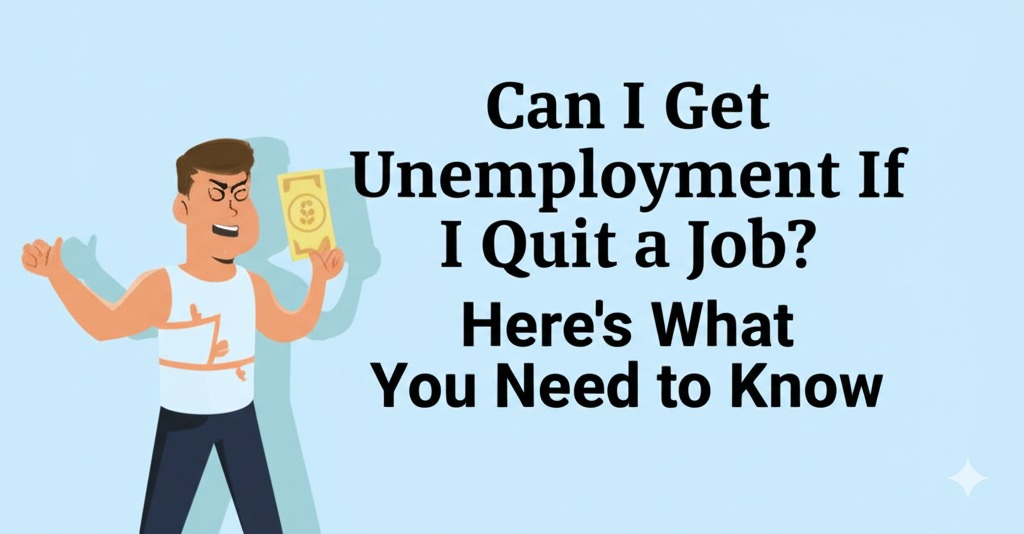
Thinking about quitting your job but worried about unemployment benefits? You’re not alone. Many workers wonder: Can I get unemployment if I quit a job? The short answer is sometimes. While quitting usually disqualifies you from unemployment benefits, there are key exceptions that might still make you eligible.
In this article, we’ll break down the rules around unemployment benefits for those who voluntarily leave their jobs. You’ll learn about valid reasons for quitting, how to apply, and what to expect from the process.
Understanding Unemployment Benefits
Before we get into the exceptions, it’s important to understand how unemployment benefits typically work.
Unemployment insurance is a state-managed program designed to support workers who lose their jobs through no fault of their own. It provides temporary financial assistance while they search for new employment.
General Eligibility Requirements
To qualify for unemployment, you usually need to meet the following:
- You must be unemployed through no fault of your own
- You must have earned enough wages in your base period (usually the last 12–18 months)
- You must be able and available to work
- You must be actively seeking new employment
Can You Get Unemployment If You Quit?
In most cases, quitting disqualifies you from unemployment benefits. However, there are exceptions based on the reason you quit.
Let’s explore the valid scenarios where quitting may not be held against you.
Valid Reasons for Quitting and Still Getting Unemployment
1. Hostile or Unsafe Work Environment
If your workplace became toxic, unsafe, or abusive, you may be eligible for benefits. This includes:
- Sexual harassment
- Physical danger or hazardous conditions
- Workplace bullying or discrimination
Tip: You’ll need to show that you made efforts to resolve the issue, such as reporting it to HR, before quitting.
2. Medical Reasons
If you quit due to a serious health condition that prevents you from performing your job, you may still qualify—especially if:
- A doctor advised you to leave
- Your employer couldn’t accommodate your condition
3. Family Emergencies or Caregiving
You might be eligible if you had to quit to care for:
- A sick family member
- A newborn child without maternity/paternity leave
- A dependent in crisis
Each state evaluates this differently, but family-related resignations are sometimes covered.
4. Relocation Due to Spouse’s Job
Some states provide unemployment benefits if you had to move because your spouse was relocated for military or job-related reasons.
Check your state’s specific rules—this exception is not universal.
5. Constructive Discharge
If you were essentially forced to quit because your employer made your job intolerable, that may count as a “constructive discharge.”
Examples include:
- Major changes to job duties or pay
- Demotions without cause
- Reduction in hours making it impossible to sustain income
How to Prove You Had “Good Cause” to Quit
To receive benefits after quitting, you’ll need to prove you left for a good cause. That often includes:
- Documentation: Emails, medical records, HR complaints, or relocation orders
- Statements: From witnesses, doctors, or family members
- Efforts to Resolve: Showing you tried to fix the problem before leaving
How to Apply for Unemployment After Quitting
Even if you’re unsure, it’s usually worth applying. Here’s how to start:
Step-by-Step:
- Visit your state’s unemployment website
- Submit your application online
- Include honest, detailed reasons for quitting
- Provide documentation if requested
- Keep filing weekly claims while your case is reviewed
Be prepared for a phone interview or written questionnaire to explain your situation.
What Happens After You Apply?
Once you apply:
- Your claim will be reviewed
- You may be asked for more information
- Your employer may be contacted to verify your claim
- A decision will be made in a few weeks
If denied, you usually have the right to appeal. Many workers win their appeals with the right evidence.
State-Specific Rules Matter
Unemployment benefits are managed at the state level, so rules can vary. For example:
- California tends to be more lenient with family and medical reasons
- Texas has stricter definitions for “good cause”
- New York considers domestic violence or unsafe working conditions valid reasons to quit
Always check with your state’s Department of Labor for the most accurate and up-to-date information.
Final Thoughts: Know Your Rights Before You Quit
So, can you get unemployment if you quit a job? The answer depends on your reason for leaving and your ability to prove it was for a good cause. While quitting usually disqualifies you, exceptions do exist—and many people successfully receive benefits with proper documentation.
If you’re thinking about quitting, make sure to:
- Understand your state’s rules
- Gather evidence
- Explore alternatives like transferring roles or medical accommodations

Andre Cuevas provides career insights, job search strategies, and professional advice to help individuals navigate the job market and achieve their career goals.





